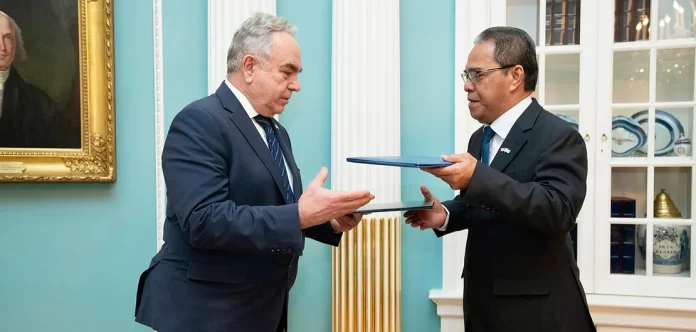
Torn between two superpowers, the Federated States of Micronesia(FSM) cautiously navigates a complex diplomatic arena with a hedging approach.
Washington calculates its treads as well.
The FSM is the only freely associated state with diplomatic relations with China.
“We really like our relationship with both countries because it gives us the opportunity to be a peacekeeper in the region,” FSM President Wesley said in a phone interview with the Pacific Island Times.
The amended Compact of Free Association “solidifies the U.S-FSM partnership,” officials said following President Biden’s signing of the updated treaty last month.
The compact renders the U.S an upper hand with its exclusive defence rights in the Pacific island nation, keeping the Chinese military at bay.
The COFA Amendment Act was signed six months after the U.S economic provisions expired. Before the enactment, the stalled congressional action on the measure raised concerns among FAS officials, U.S lawmakers and defence experts who warned that failure to extend the economic provisions would incentivise China to further expand its footprint in the region.
“I don’t think China can ever match what the United States is offering in terms of economic assistance and other type of relationship,” Simina said.
“China is more interested in just making sure that there continues to be a friendly relationship between our two countries and that feeling is mutual between us.”
The FSM’s relations with Washington and Beijing are well delineated, Simina said. The nature of the FSM’s diplomacy with China “has been more on the economic and technical cooperation, and we very much appreciate that,” the Micronesian leader said.
With the U.S, he added, “our relationship is far more comprehensive because the compact contains different components, including security and defence, immigration.”
The COFA Amendment Act renews the U.S economic assistance to the freely associated states, which include the FSM, Palau and the Marshall Islands. The $7.1 billion package, which includes US$634 million for the U.S postal service, is broken down into US$3.3 billion for the FSM, US$2.3 billion for the Marshall Islands, and US$889 million for Palau.
The provisions begin this year and will run through 2043. The funding will support the Pacific island nations’ basic public services, such as health and education, improve infrastructure, and bolster the health of the compact trust funds previously established for each Pacific island nation.
In the next 20 years, the FSM will receive US$140 million in sector grants yearly. However, Simina said the amount leaves much to be desired. “We should have a much higher number,” he said.
In the initial stages of the renegotiation, the FSM team sought an annual grant of US$180 million to cover all government programmes and operational costs.
The requested amount was double the US$90 million the FSM received under the 20-year cycle that expired in 2023.
Ultimately, U.S and FSM negotiators shook hands on the compromise amount, agreeing to US$140 million a year.
One of the most critical projects that will benefit from the extended U.S aid is the long-delayed Chuuk hospital replacement. The project has been allotted US$8.48 million out of the US$9.8 million earmarked for the infrastructure sector this year. The amount will cover the design and preliminary work.
“This project has been delayed for over 10 years for all kinds of reasons, but we’re grateful to the United States and those who work on it because now we see the light at the end of the tunnel,” Simina said. “We feel that it can now start the construction.”
While the amended COFA gives the FSM flexibility to decide on sector allocations, the agreement requires that 25 percent of the annual grants be set aside for infrastructure. The amended treaty lifts the requirement for the FSM to make local matching contributions to the Infrastructure Maintenance Fund.
“The FSM is satisfied with the outcome of the negotiations for extension of the economic provisions of the compact,” Simina said.
Ely Ratner, assistant secretary of the Department of Defence, said he was pleased that the U.S Congress finally passed COFA, which secures the U.S. military’s position in the region.
“The compacts also limit the access of third country militaries or their personnel, including would-be adversaries from accessing FAS land, airspace, and territorial seas, securing a key area of the Indo-Pacific region,” Ratner said in his testimony before the Senate Foreign Relations Committee on 14 March.
“Crucially, FAS citizens serve in the U.S Armed Forces at higher proportionate rates than most American states, and we are proud of and grateful for their service.”
Simina visited Washington D.C last month to witness the COFA signing. During his trip, the president met with Secretary of Defence Lloyd Austin, and Assistant Secretary of State Kurt Campbell to discuss Title III, the security and defence section of the compact. The discussion tackled the runway expansion of the Yap International Airport, where military exercises will be conducted, among other “new defence opportunities.”
“We’re very grateful that many things were discussed and we were able to agree on some of the things to implement the applications of the new compact,” Simina said.
“We discussed several things in line with our applications and responsibilities under Title III,” he said.












